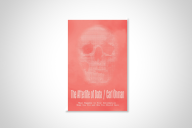You have /5 articles left.
Sign up for a free account or log in.
On newstands now -- or at least the ones with a decent selection of foreign periodicals -- you can find a special number of Le Magazine littéraire devoted entirely to Jean-Paul Sartre. Last month was the 25th anniversary of the grand funeral procession in Paris that drew 50,000 people out into the spring rain to see him off. (It was the last great demonstration of the 1960s generation, as people said at the time.) And next month marks the centennial of his birth.
He was "the conscience of his times," the cover announces. That is certainly arguable. It tends to equate denunciation with ethical critique. The man who declared, in 1952, that Soviet citizens enjoyed perfect freedom to criticize their government should probably be Exhibit A for any demonstration that sometimes contrarianism is not enough.
But what is not in doubt – to judge by the rest of issue – is that Sartre was the most-photographed philosopher in history.
I don’t mean that to be quite as sardonic as it probably sounds. One of Sartre’s definitive themes was the struggle between radical human freedom (in which each moment of one’s existence involves a choice) and the alienating experience of being defined by the gaze of the Other. It is striking to look at so many pictures of Sartre -- so many instances when the camera “caught” him, freezing him into an icon.
It is a commonplace now to grumble that the golden age of the grand intellectual is gone, replaced by what, in the late 1990, Pierre Bourdieu called les fastthinkers, those well-spoken authorities who can be summoned to the television studio to "think faster than a speeding bullet." Nobody who struggles through the denser pages of Sartre’s work -- his efforts to create an "existential psychoanalysis," for example, and then to square it with the work of Marx -- will confuse him with, say, David Brooks.
The other posthumous role Sartre plays in the cultural imagination is that of the academic escapee. He was a philosopher who lived and worked "in the world," not in the university. Indeed, reading the letters he exchanged with Maurice Merleau-Ponty during their political falling-out, I was struck by a passage in which Sartre needles his ex-friend for lacking the nerve to take some distance from academic life.
(That exchange can be found in The Debate between Sartre and Merleau-Ponty, published by Northwestern University Press, which also contains an important paper by Ronald Aronson, who has also written the definitive book on another personal/political break, Camus and Sartre: The Story of a Friendship and the Quarrel that Ended It, which has just appeared in paperback from the University of Chicago Press.)
So the lingering afterimage of Sartre is now a double negation: Neither pundit nor professor, a mind that was free – or at least moving somewhere beyond both media and academe.
Not only did the philosopher escape their gravitational pull, but he was at was at war with the tendency of his own work to solidify into something inert. He rejected the Nobel Prize for Literature because, among other things, he said that he did not want to become an institution. But Sartre also spoke of thinking "against myself" – of throwing himself into the struggle "to break some bones in my own head."
Interviewed in 1959 – while finishing the first volume of his Critique of Dialectical Reason, a work whose ungainly style owes something to the fact that Sartre popped amphetamines constantly while writing it – he said he was looking forward to having his ideas “deposited in little coffins.” He wanted to be done with the ideas that he had been pursuing; he wanted to feel empty again.
"A writer is fortunate if he can attain such a state," he told the interviewer. "For when one has nothing to say, one can say everything....What is primary is what I haven’t yet written – what I intend to write (not tomorrow, but the day after tomorrow) and what perhaps I will never write."
It is an incredibly appealing notion – a dream of perfect freedom, and of constant renewal. And it is also something of an illusion. So one learned from Annie Cohen Solal's Sartre: A Life, first published in France in 1985. (The translation has just been reissued by the New Press – one of the few publications in English, at least so far, to mark this year’s double anniversary.)
Cohen-Solal’s portrait revealed a man who was both an incredibly well-polished product of the upper echelons of the French educational system and a canny player in the game of Parisian literary politics. As his work reached an American readership in the late 1940s, its arrival was shaped by a similar combination of academic and media forces. Ann Fulton’s book Apostles of Sartre: Existentialism in America 1945-1963 (Northwestern University Press, 1999) shows how his reception benefitted from both the support of professors in the French department at Yale University and publications about him in popular magazines.
He ascended to the position of "consecrated heretic" -- a culturally sanctioned gadfly, the embodiment of social criticism, in definace of all conformism. That is the term (coined by Bourdieu) that Paul M. Cohen applies to Sartre in Freedom’s Moment: An Essay on the French Idea of Liberty from Rousseau to Foucault (University of Chicago Press, 1997).
The consecrated heretic has no authority beyond the power of his thought and his example. Someone unimpressed or horrified by any particular consecrated heretic is likely to notice that he is also thereby relieved of any particular responsibility or accountability.
"Responsibility" was, of course, a decisive term in the Sartrean lexicon. Each of us is ultimately responsible for the creating, from our freedom, whatever commitments give meaning to our lives. But on a less metaphysical plane of responsibility, Sartre’s example presents an especially knotty set of problems.
In his introduction to the new edition of Cohen-Solal’s biography, Cornel West offers a judicious evaluation of the thinker’s political legacy – his courage and incisiveness in denouncing racism and colonialism, the amoral and sometimes merely dishonest nature of some of his statements about Communism, and his surprising tendency to downplay the Palestinian question. Sartre was a passionate and very firm supporter of the right of Israel to exist as a state.
So how do you come to a final judgment on such a figure? Was he the "conscience of his time" or a symptom of its disorders?
It’s not clear that a decision is possible or desirable. At least, not on any level beyond choosing either idol-worship or contempt. I’ve been reading Sartre my entire adult life (and then some) – and have gone to both extremes, along the way.
And now, in the midst of these anniversaries, what is less impressive than any given position he assumed than his willingness -- from time to time -- to think against himself. There is much to admire in his example, and much to avoid. But more than anything else, I keep going back to him in hopes of learning how to break a few bones in my head.








